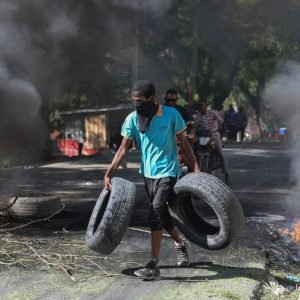An organization that sends volunteers from Canada — and other parts of the world — to work on Israeli military bases is facing a renewed legal challenge, alleging its recruiting efforts violate a federal law against inciting Canadians to join a foreign army.
The non-profit group Sar-El says it has recruited more than 40,000 volunteers from over 30 countries since the Israel-Hamas war broke out last year — to provide logistical support to the Israel Defence Forces (IDF), such as packing supplies and cleaning and repairing equipment.
Daniel, a 42-year-old business owner from Toronto, is one of them.
“For me, it was an opportunity to give back to the brave [Israeli] soldiers who are fighting. It’s a way to get involved with the war effort,” said Daniel, who agreed to share his experience with Radio-Canada on the condition of anonymity to avoid any backlash that could harm his business.
He says he went to Israel as a Sar-El volunteer in February and August, staying both times for five days in an army base in the Negev desert, in the south.
Daniel says he “felt safe at all times,” despite the danger of staying at a military base in the midst of war.
“I went [to Israel] with the mentality that what will be, will be.”
In contrast, in a long post published on Facebook in December 2023, another volunteer, who says he is from Montreal, recounts having spent a month alongside Israeli soldiers in Eilat, a region southern of Israel, on the shores of the Red Sea.
The volunteer, whose identity is not disclosed for privacy reasons, wrote that he was “under rocket fire close enough and to such an intensity it felt as if the air itself shook.”
“The rockets I had only seen on TV from thousands of miles away were now fully intended to kill me and my comrades.”
A lawyer handling the legal challenge against Sar-El in Canada says the group’s efforts are a “blatant” violation of federal law, an opinion not shared by prosecutors who previously opted not to pursue the matter.
‘Tourists who want to help’
Radio-Canada tried for several weeks to speak with representatives from Sar-El in Israel and in Canada but they didn’t respond to several interview requests.
An information session for would-be volunteers was organized in Ottawa on Sept. 26. Radio-Canada tried to attend, but organizers refused any media presence.
Sue Potechin, from the Soloway Jewish Community Center where the session took place, is listed as the contact person to register for it. She says the volunteers “do support work, doing things that no one else has time to do,” such as “cleaning the kitchen and sorting boxes.”
She says that volunteers are not sent to the front lines with Israeli soldiers, who are engaged in wars in the south, against Hamas in the Gaza Strip, and in the north, against Hezbollah in Lebanon.
The army “doesn’t let you near anything like that,” Potechin said.
The Sar-El program is “basically for tourists who want to help,” she said.
Volunteers also “perform duties such as packing food rations or medical kits, cleaning tanks … [and] changing spare parts,” according to the IDF website.
They live “under the same conditions as the soldiers … and wear army uniforms,” says Sar-El’s website.
Whatever the army needs, “the volunteers are doing it,” Sar-El CEO Keren Dahan said in an interview with the American channel Jewish Broadcasting Service (JBS), published on YouTube in April.
“Without logistics, even the best combat unit cannot win,” she said. “If they’re not eating well, if the weapon is not clean … if they don’t have all the materials they need.”
It is not clear how many Canadians volunteered over the past year. In 2022, the president of the Canadian branch told the Canadian Jewish News website that his organization recruits “between 100 and 150 volunteers” each year.
However, this figure is likely to be higher today. Dahan told JBS that Sar-El’s total recruitment has increased eightfold, to 40,000 people, since the start of the war.
Since it was founded in 1983, Sar-El — a Hebrew acronym meaning “Service for Israel” — says it has sent more than 240,000 volunteers to Israel.
Reaching out to youths
According to Dahan, the organization’s recruiting strategy has changed over the last two years in order to attract younger volunteers.
“Before, it was always retired IDF [volunteers], old people in their 60s and 70s,” she told JBS. Now, the group is reaching out to youth through schools, synagogues and online.
“We are on Instagram and this is very, very new, we’re doing … a lot of advertising.”
The minimum age to participate is 17, though 16-year-olds can be accepted “with a parent or adult relative,” according to the website.
The cost to participate is around $120 for one week and $60 for each additional week.
Dahan also says that around 25 per cent of the volunteers are non-Jewish. “Israel needs friends everywhere, it does not matter if they’re Jewish or non-Jewish,” she said.
Yesterday, sar-el welcomed 14 doctors from France, Canada and the USA to Israel. They will be undergoing a course to integrate them into the IDF we’re they will assist in emergency medical forces. We are amazed by the power to help during these times.
KOL HAKAVOD! pic.twitter.com/atJDHMmhuM
Daniel, the volunteer from Toronto, is Jewish but doesn’t hold Israeli citizenship. He says he was very impressed with the number of non-Jewish recruits in Sar-El.
“In my group, there were quite a few Canadians … but also people from Bolivia, Ecuador, Argentina, China,” he said. “We had a guy from South Africa who wasn’t Jewish. He was a weapons expert.”
The base he was assigned to also had non-Jews in its ranks, Daniel said. “There were Druze but also Israelis who originally came from India.”
Legal challenges
In Canada, the Foreign Enlistment Act prohibits anyone from inciting another person to enlist in the armed forces of a foreign state, unless carried out by diplomats “enlisting … nationals of the countries they represent and not Canadian nationals.”
Based on that, a legal challenge was brought against Sar-El in September 2022 by David Mivasair, an Ontario-based rabbi, and Rehab Nazzal, a Toronto-based artist of Palestinian descent. They alleged the group is “recruiting or inducing individuals” to volunteer with the IDF.
The case was dropped a couple of months later by the Public Prosecution Service of Canada (PPSC) for “lack of evidence.”
But the case is not closed, according to their lawyer Shane Martinez.
“We are now in the process of appealing,” the PPSC decision, and will take it to the Ontario Court of Appeal on Nov. 7, he said.
“Essentially what we’re saying is that the government acted in bad faith, that they interfered for political purposes,” said Martinez, who also represents the International Centre of Justice for Palestinians, a group of pro-Palestinian lawyers.
“Imagine if there was an organization in Canada that was recruiting volunteers for the Russian army — they would go there and they would wear Russian military uniforms, they’d live on Russian bases, they would repair Russian weapons, clean Russian tanks,” he said.
“The government wouldn’t allow it for a second. They’d immediately step in.”
“It’s so blatant. It’s perhaps one of the clearest violations of Canadian law in this context that we could possibly think of,” he said.
But the PPSC says there’s no evidence Sar-El Canada “recruits or otherwise induces” anyone to join the IDF.
“As part of the application process, the volunteer acknowledges that they do not intend to serve, join or swear allegiance to the IDF,” wrote Marten Dykstra, counsel for the PPSC, in a letter explaining why it dropped the case.
“While there is a connection between the volunteer and the IDF, there is no evidence of a formal relationship.”
There are currently more than 6,000 Canadians in Israel, according to Global Affairs Canada (GAC).
Since August, the federal government has recommended avoiding all travel to Israel because of the war.
“The security situation can deteriorate further without warning,” GAC warns on its website.
However, insecurity in the Middle East does not seem to dampen Daniel’s enthusiasm. He says he would not hesitate to volunteer for a third time with Sar-El.
“It’s important work,” he said. “The IDF need all the help they can get.”






